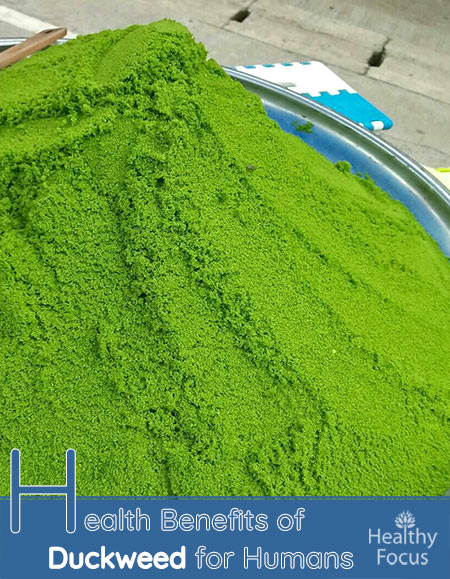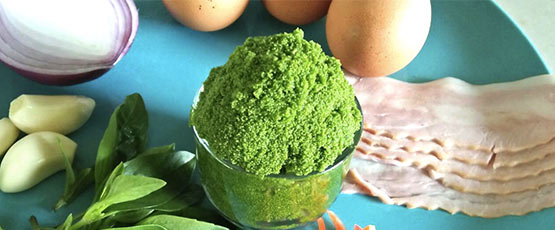Last Updated on September 8, 2019 by Marc Seward
The list of foods touted as potential ‘superfoods’ is continuing to grow. Not all of theses foods deserve the title and their reputation is often based on shaky grounds. Recent research into the potential benefits of duckweed – specifically a new strain of the aquatic plant called ‘Mankai’ duckweed has piqued the interest of researchers.
A very recent study has revealed that Mankai duckweed has a number of potential benefits. It is extremely high in protein and includes all nine essential amino acids while it can also help maintain blood-sugar control.
What is Duckweed?
For pond owners, duckweed is seen as a real nuisance. Indeed, if you search for duckweed online, you are more likely to come across articles about how to get rid of the stuff than articles about how to cook it.
I live in a part of Thailand where duckweed has long been consumed by humans. Duckweed is the common name for any of 11 species of aquatic plant, known scientifically as Wolffia. In Thailand, the species used for human consumption is called Wolffia globosa. The Thais refer to the plant as Kai naam (water eggs).
Duckweed, which is also commonly known as watermeal, resemble tiny pieces of cornmeal as they float on the surface of the water. Most species of Wolffia can be found in many parts of the world but outside of South east Asia, they have never been considered for human consumption – until recently.
In Thailand and come other countries in South East Asia, the plant is skimmed from the top of the water before being cleaned and cooked then eaten as a vegetable.
Nutritional Value
Protein makes up over 45% of the pant’s dry weight and Its incredibly high protein content gave rise to another common name – ‘vegetable meatball’.
Duckweed contains all nine of the essential amino acids giving it a protein profile similar to eggs. This makes the plant a potential source of high quality protein for vegans and in areas of the world where nutritional support is needed.
Duckweed is also a great source of nutrients including many minerals and vitamins. minerals. Duckweed is a good source of vitamin A and the B-complex vitamins and is a unique plant source of vitamin B12. The plant is a good source of dietary fiber and contains minerals like zinc and iron. In addition, duckweed contains abundant antioxidants including polyphenols, and flavonoids like catechins.
Duckweed Benefits : Recent Studies
Until very recently, there has been little in the way of scientific research into the potential health benefits of duckweed. However, a very recent study, published in the August 2019 edition of Diabetes Care has revealed that it has a number of health benefits for humans.
The Israeli research team compared the effects of consuming Mankai duckweed shakes with a yogurt shake comprising equivalent amounts of calories, carbohydrates, lipids and proteins.
The participants were monitored for two weeks with glucose sensors to evaluate the body’s blood-glucose response. Those who drank the shake made with duckweed demonstrated significantly better responses in a number of measurements. These included lower fasting glucose levels, lower peak levels and faster evacuation of glucose.
Moreover, the participants who drank the duckweed shake also felt slightly more full than those in the yogurt group. (1)
Previous studies had found that duckweed was a valuable source of protein while the iron content of the plant could help protect against anemia. (2) (3)
Health Benefits
An Excellent Source of Protein
Duckweed is extremely high on protein making it an excellent source of sustainable plant based protein and a good alternative to the more common animal sources. A study published in 2018 set out to analyse the protein bioavailability of duckweed – Wolffia globosa and found that it was extremely high in proteins and other nutrients.
The researchers found that duckweed contained all 9 of the essential amino acids as well as being rich in minerals like zinc and iron and vitamin B12.
The study, which involved 36 male subjects, found that the protein found in duckweed was highly bioavailable. The absorption rate of its amino acids was similar to that of soft cheese.
The researchers concluded that mankai duckweed offered high-quality protein and was a potential substitute source for animal proteins. (3)
Blood-Sugar Control
A very recent study revealed that duckweed helped keep blood sugar levels under control making it a good choice for people with diabetes in particular.
The blood-sugar response of those given a duckweed shake was compared with subjects given a yogurt shake. Drinking a shake made with duckweed resulted in a number of positive health benefits when measured over a two week period. These included improvements in fasting glucose levels, reductions in peak glucose levels and more rapid evacuation of glucose from the system. (1)
Vitamin B12
Duckweed is a good source of many minerals and vitamins and studies have found that duckweed is a unique plant source of vitamin B12.
Vitamin B12, also known as cobalamin, is a vitamin that your body very much needs but is unable to produce. It is mostly found in animal sources but is also added to certain food products.
Vitamin B12 benefits the body in a wide variety of ways including the following:
- It can boost your levels of energy.
- It helps the production of red blood cells.
- It can prevent birth defects making it important for pregnant women.
- Might have brain health benefits.
- May help protect against depression.
- Supports healthy skin and hair.
Bone Health
Duckweed contains minerals like calcium, which is known for making the bones stronger and healthier while the vitamin B12 it contains has also been linked to bone health and strength.
One study involving over 2500 adults found that people with a deficiency in vitamin B12 had lower than average bone mineral density. (4)
Other studies have revealed a link between low B12 levels and poor bones, which in turn can lead to osteoporosis particularly in women. (5)
Anemia
Duckweed is a good source of minerals including iron. One study found that adding Mankai duckweed to the traditional Mediterranean diet was an effective way of adding more iron to the system as well as folic acids.
The study also suggested that duckweed was an effective way of treating anemia in iron-deficient rats. This makes duckweed a potential source of iron for vegans and others with an absence of red meat in their diets. (2)
Antioxidants
Duckweed is a good source of various antioxidants including flavonoids and polyphenols. No studies have been done into the disease prevention abilities of duckweed but the antioxidants found in the plant have been linked to the prevention of disease.
Antioxidants help protect us from cellular damage and can even help reverse damage done by free radicals or oxidative stress.
Digestive Health
Duckweed is a good source of dietary fiber, which is essential to good digestive health. Getting plenty of fiber into the system is linked to improved digestive health and can help protect against common digestive troubles including constipation, diarrhea, stomach upset and bloating.
Weight Control
There may also be benefits in terms of weight control. As we have already mentioned, one study found that the participants who consumed duckweed shake felt slightly more full than those who were given a yogurt shake. Dietary fiber tends to make people feel more full and may result in fewer calories being consumed during the day.
Of course, duckweed is no magic weight loss pill but in the long term, as part of a sensible diet and exercise plan, it may contribute to some weight loss.
Sustainability
Companies in Israel have started to grow the Mankai species of duckweed in closed environments. It is good for the environment and is highly sustainable. When compared to other nutritious foods like spinach, kale and soy, duckweed requires just a fraction of the water to produce a gram of protein.
Not only does it help save water, but can be grown all the year round with hydroponic cultivation methods.
How To Use Duckweed
At this point in time, duckweed is not readily available for human consumption but with companies taking a commercial interest in the product, that may be about to change.
In the future, the plant may be available in fresh or dried form making it easy enough to add as an ingredient to a range of different meals or drinks.
In Thailand, it is used as an ingredient in soups, while I personally enjoy it as y it for breakfast mixed into an omelet. You could also use the plant as an ingredient for making pastas or add it to a healthy shake or smoothie.
Frequently asked Questions
What does duckweed taste like?
Duckweed confers plenty of nutrients but not a great deal of flavor. The plant has a mild, neutral flavor and is completely odorless. I add it to omelets and soups and it adds a small amount of flavor reminiscent of spinach.
Is duckweed safe to eat?
As long as your duckweed comes from a clean source, it is safe for human consumption. There is however concern about the high levels of calcium oxalate found in the plan (2-4% by weight). Calcium oxalate is also present in other leafy green vegetables like swiss chard and spinach but at a considerably lower level. Calcium oxalate may be toxic in very large doses. Cooking your duckweed can reduce the levels of calcium oxalate found in the plant.
How can you use duckweed?
To ensure that your duckweed is free from toxins, it is important to boil it before use. After boiling, strain or squeeze out any excess water and add the plant to a variety of dishes. You can use it to make omelets, sprinkle it in your soups or even prepare it as an ingredient in a dip. You can also use it to make green pasta as a replacement for spinach or add it to your shake recipes.
Where can you buy it?
If you live in South east Asia, it is easy enough to find duckweed for sale in the local markets. However, at present in the West, it is virtually impossible to find duckweed grown and prepared for human consumption. This may change in the near future with companies looking to cultivate the plant for human consumption
Final Thoughts
Duckweed has been eaten in parts of Asia for a very long time and it is only now that the West has started to evaluate its potential benefits for human consumption.
It is an excellent source of proteins as well as being a unique source of plant-based vitamin B-12. Studies have also found that it has a significantly positive effect on blood sugar levels.
While research is at a very early stage, the evidence so far suggests that this plant is highly sustainable and could provide an excellent source of nutrients for an affordable price.
At the time of writing, duckweed is not being commercially grown for human consumption but that may well change soon.
(1) https://www.ncbi.nlm.nih.gov/pubmed/31076421
(2) https://www.ncbi.nlm.nih.gov/pubmed/30915471
(3) https://www.ncbi.nlm.nih.gov/pubmed/30591380
(4) https://www.ncbi.nlm.nih.gov/pubmed/15619681
(5) https://www.ncbi.nlm.nih.gov/pubmed/12612156


Leave a Reply
You must be logged in to post a comment.